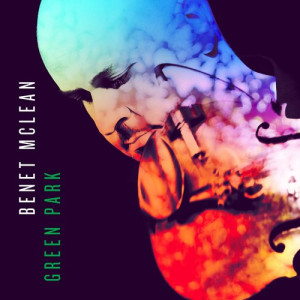 Way back in the ’90s I started listening to Django Reinhardt because Richard Thompson named him as an influence. The more I listened to Django the more enamored I became of the playing of Stephane Grappelli, his fiddling compatriot in the Hot Club of France. I’ve been a fan of jazz violin ever since, and now I can add Benet McLean to my list of favorite players.
Way back in the ’90s I started listening to Django Reinhardt because Richard Thompson named him as an influence. The more I listened to Django the more enamored I became of the playing of Stephane Grappelli, his fiddling compatriot in the Hot Club of France. I’ve been a fan of jazz violin ever since, and now I can add Benet McLean to my list of favorite players.
McLean’s solo debut on violin, Green Park is an impressive showcase of his prodigious talents for composing, arranging, and playing. McLean started playing and studying violin at age 3, and he took classical training for several years before turning to jazz. He initially emerged as a pianist on the London jazz scene, putting out a string of critically acclaimed albums before turning back to his first love, violin.
The album’s success also rides heavily on the ensemble of talented young London scene players McLean has assembled. On Green Park he’s joined by Duncan Eagles on tenor sax and flute, Liam Dunachie on piano and organ, Rio Kai on double bass and the young Portuguese phenom Zoe Pascal on drums. Together they’ve turned in a set of six McLean originals and one modern standard that blend hard bop, jazz rock fusion, and more in a way that mirrors the present day mood.
“The general vibe of the past few years has felt intense, and it got me thinking about just how much the vibe and the energy in our lives can change,” McLean says. “I wanted to try and capture the feeling of some of those shifting energies we experience during our lives.”
One of the keys to the shifting moods is keyboardist Dunachie. His delicious organ playing lends a bluesy, funky flavor to the opening groove of “Blue Fingers,” which sets the table for the date’s ongoing expert blend of styles; likewise the swinging blues of “Mr Bap” on which Dunachie takes a killer solo.
Elsewhere, as on “Lucy,” a jaunty original blues that feels like an instant standard, his piano pushes things in the bop direction; same with the lone cover Robert “Bobby” Watson’s “Fuller Love,” as done by The Jazz Messengers. This driving number definitely showcases the album’s bop-fusion blend, and very much follows The Jazz Messengers’ arrangement rather than Watson’s own more spiritual mood. And young Pascal pays credible homage here to Art Blakey’s propulsive, forceful style on the kit.
Things slow down on the lush romantic ballad “Red,” which has some meltingly delicious duetting by McLean and Eagles on violin and sax. Here McLean tosses off some very classical sounding, downward cascading cadenzas during his solo pass. It’s on the other slower number “The Pharaoh” that McLean really develops a melange of folk, classical and experimental styles that highlight this mysterious song – and Pascal’s metronomic cowbell and blocks steadily count down time’s relentless passage. The record wraps with “Jo,” a frantic jazz rock fusion romp that somehow grows out of a warm-hearted melodic head that calls to mind Hank Williams’s “Cold, Cold Heart.”
If, as the one-sheet says, “Green Park reflects the energy and musical melting pot of the quintet’s live shows together” (and I’ve every reason to believe that), this must be a tremendously entertaining act to see live. This vibrantly recorded studio album will have to do for those of us on this side of the Pond for now, and I’m thankful we have it. Recommended.
(Sea Mammal Records, 2023)
